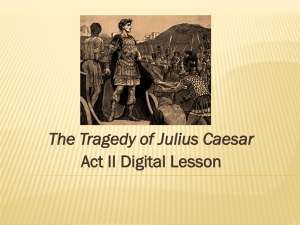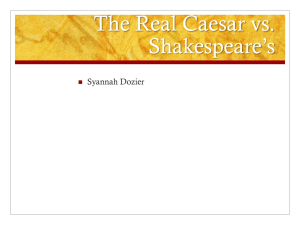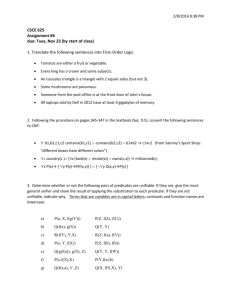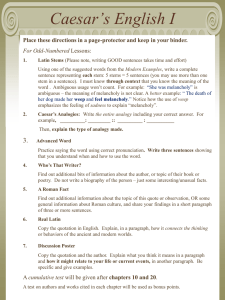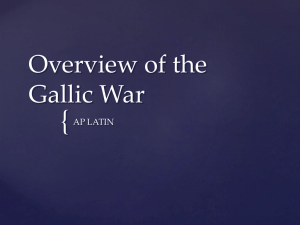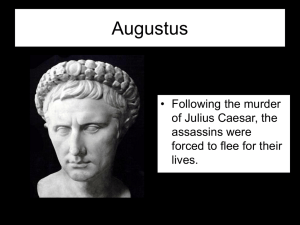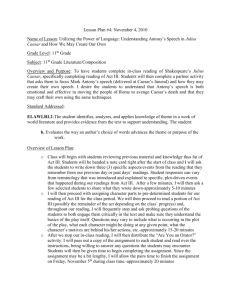Name: Date: Period: Global History and Geography I
advertisement
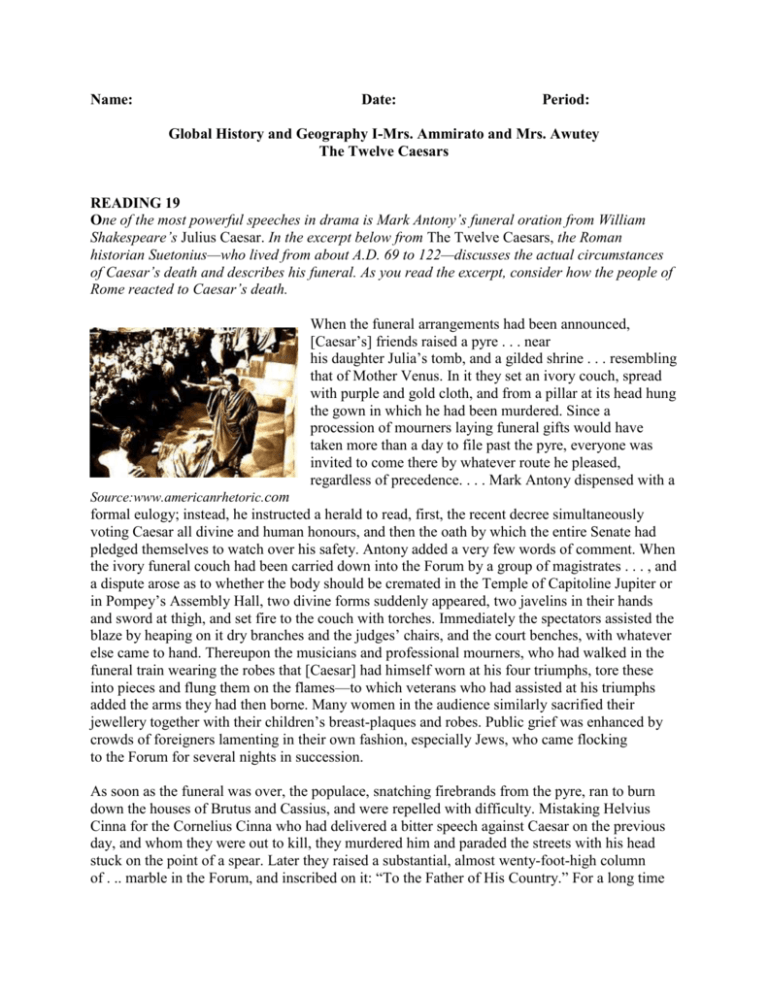
Name: Date: Period: Global History and Geography I-Mrs. Ammirato and Mrs. Awutey The Twelve Caesars READING 19 One of the most powerful speeches in drama is Mark Antony’s funeral oration from William Shakespeare’s Julius Caesar. In the excerpt below from The Twelve Caesars, the Roman historian Suetonius—who lived from about A.D. 69 to 122—discusses the actual circumstances of Caesar’s death and describes his funeral. As you read the excerpt, consider how the people of Rome reacted to Caesar’s death. When the funeral arrangements had been announced, [Caesar’s] friends raised a pyre . . . near his daughter Julia’s tomb, and a gilded shrine . . . resembling that of Mother Venus. In it they set an ivory couch, spread with purple and gold cloth, and from a pillar at its head hung the gown in which he had been murdered. Since a procession of mourners laying funeral gifts would have taken more than a day to file past the pyre, everyone was invited to come there by whatever route he pleased, regardless of precedence. . . . Mark Antony dispensed with a Source:www.americanrhetoric.com formal eulogy; instead, he instructed a herald to read, first, the recent decree simultaneously voting Caesar all divine and human honours, and then the oath by which the entire Senate had pledged themselves to watch over his safety. Antony added a very few words of comment. When the ivory funeral couch had been carried down into the Forum by a group of magistrates . . . , and a dispute arose as to whether the body should be cremated in the Temple of Capitoline Jupiter or in Pompey’s Assembly Hall, two divine forms suddenly appeared, two javelins in their hands and sword at thigh, and set fire to the couch with torches. Immediately the spectators assisted the blaze by heaping on it dry branches and the judges’ chairs, and the court benches, with whatever else came to hand. Thereupon the musicians and professional mourners, who had walked in the funeral train wearing the robes that [Caesar] had himself worn at his four triumphs, tore these into pieces and flung them on the flames—to which veterans who had assisted at his triumphs added the arms they had then borne. Many women in the audience similarly sacrified their jewellery together with their children’s breast-plaques and robes. Public grief was enhanced by crowds of foreigners lamenting in their own fashion, especially Jews, who came flocking to the Forum for several nights in succession. As soon as the funeral was over, the populace, snatching firebrands from the pyre, ran to burn down the houses of Brutus and Cassius, and were repelled with difficulty. Mistaking Helvius Cinna for the Cornelius Cinna who had delivered a bitter speech against Caesar on the previous day, and whom they were out to kill, they murdered him and paraded the streets with his head stuck on the point of a spear. Later they raised a substantial, almost wenty-foot-high column of . .. marble in the Forum, and inscribed on it: “To the Father of His Country.” For a long time afterwards they used to offer sacrifices at the foot of this column, make vows there, and settle disputes by oaths taken in Caesar’s name. Some of [Caesar’s] friends suspected that, having no desire to live much longer because of his failing health, he had taken no precautions against the conspiracy, and neglected the warnings of soothsayers and well-wishers. It has also been suggested that he placed such confidence in the Senate’s last decree and in their oath of loyalty, that he dispensed even with the armed Spaniards who had hitherto acted as his permanent escort. A contrary view is that as a relief from taking constant precautions, he deliberately exposed himself, just this once, to all the plots against his life which he knew had been formed. Also, he is quoted as having often said: “It is more important for Rome than for myself that I should survive. I have long been sated with power and glory; but, should anything happen to me, Rome will enjoy no peace. A new Civil War will break out under far worse conditions than the last.” Almost all authorities agree on one thing, that he more or less welcomed the manner of his death. He had once read . . . about the funeral instructions given by Cyrus on his deathbed, and said how much he loathed the prospect of a lingering end—he wanted a sudden one. . . . He was fifty-five years old when he died, and his immediate deification, formally decreed, was more than a mere official decree since it reflected public conviction; if only because, on the first day of the Games given by his successor Augustus . . . , a comet appeared about an hour before sunset and shone for seven days running. This was held to be Caesar’s soul, elevated to Heaven. . .. The Senate voted that the Assembly Hall where he fell should be walled up; that the Ides of March should be known ever afterwards as “The Day of Parricide”; and that a meeting of the Senate should never take place on it again. Very few, indeed, of the assassins outlived Caesar for more than three years. . . . All were condemned, and all perished in different ways—some in shipwreck, some in battle, some using the very daggers with which they had murdered Caesar to take their own lives. Source: From Gaius Suetonius Tranquillus: The Twelve Caesars, translated by Robert Graves, revised by Michael Grant. Translation copyright © 1957 by Robert Graves; revised translation copyright © 1979 by Michael Grant. Reprinted by permission of Carcanet Press Limited. 1. What was the feeling of the crowd toward Caesar’s assassins? ______________________________________________________________________________ ______________________________________________________________________________ 2. What was believed to prove that Caesar had become a deity? ______________________________________________________________________________ ______________________________________________________________________________ 3. What three explanations does Suetonius give as to why Caesar was so unprotected on the Ides of March? ______________________________________________________________________________ ______________________________________________________________________________
